Inside: Unsure about how to help a child focus in the classroom? Help your child focus and learn to concentrate better using these five core strategies at home. Post may contain affiliate links, which means at no extra cost to you I may earn a small commission if you make a purchase.
I often hear from concerned parents that their child’s teacher has shared something with them, and it sounds something like…
My child is difficult for the teacher to manage.
They take too long to do the task at hand from the teacher.
She doesn’t follow directions in school.
My child has trouble focusing in the classroom.
This puts you in a really tough position as a parent because you can’t exactly control what’s happening in the classroom. The teacher is also in a tough position, needing to manage the competing demands of a large classroom of children.
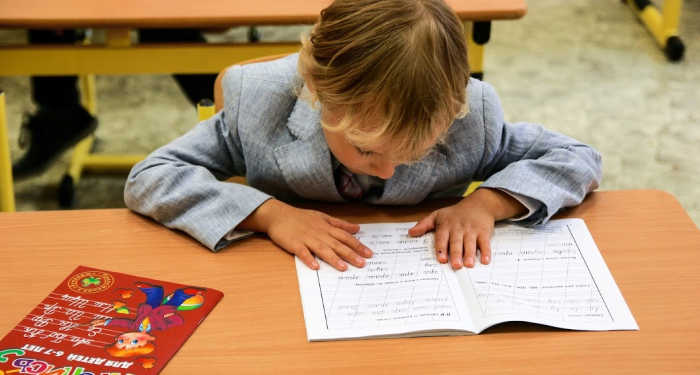
It’s hard no matter how you look at it.
Here’s where you and the teacher hold common ground: You both want the child to not only be successful in school, but in life! And of course, you want to work together in cooperation.
Which begs the question…
How to Help a Child Focus in the Classroom?
As a mom, I can wholeheartedly attest to struggles in getting my kids to focus. There was a time when I could barely get them to sit at the dinner table for five minutes – literally. Waiting in line at the post office with kids was a joke. And grocery shopping involved a lot of bribery.
We’ve come a long way since then.
Most articles you read on helping kids with lack of focus in school will recommend things like seat kids away from distractions, make learning fun, vary teaching methods, set up routines, etc.
5 fresh ideas to improve focus in kids.
All those are great strategies to use in the classroom, but what they don’t address is how you can start to help your child build focus, self-control and attention span at home.
You can’t control what happens in the classroom. You can, however, work with your child at home using five core strategies.
1. Play board games for concentration.
Board games are one of the best ways to help your child build executive function, which is the cognitive or “mind” part of self-regulation. When kids need help focusing, what you’re actually wanting to help your child do is build better self-regulation skills.
The Center for the Developing Child defines executive functions and self-regulation skills as:
the mental processes that enable us to plan, focus attention, remember instructions, and juggle multiple tasks successfully. Just as an air traffic control system at a busy airport safely manages the arrivals and departures of many aircraft on multiple runways, the brain needs this skill set to filter distractions, prioritize tasks, set and achieve goals, and control impulses.
The more you can help your child practice attention skills at home, the sooner they will be able to apply those skills and concentrate in school.
Here are some of my favorite board games to play with kids:
- Outfoxed – a cooperative whoodunit game.
- Race to the Treasure – a cooperative game for kids.
- Eye Found It! – hidden picture game.
- Suspend Junior – an exciting balance game.
For more board games to help build executive functioning in kids check out these best board games for 5 to 7 year olds and best games for self-regulation in 3 to 5 year olds.
You can also help your child learn to concentrate by using other self-control games like these:
2. Practice waiting – A LOT – to improve attention span.
Practice waiting with your kids as many times as you can fit into the day. In the doctor’s office, at the grocery store, at the dinner table and during play at home are all places that are great for practicing self-regulation.
Instead of reaching for your phone or electronic device to distract your child, practice playing games with your child while waiting. These are creative hand games or mind games to play with your child to improve focus and attention. They only require your body sitting in a chair and nothing else.
Here are some examples:
- While waiting in the doctor’s office we may play “the thinking game” where my son will describe something and I have to guess what it is.
- While at the grocery store, play “I spy” where you describe something you see and your child has to guess it.
- Have your child place his hands out palms facing up. Place your hands hovering over his, except with your palms facing down. The goal is for your child to try and slap the top of your hands. Then switch roles.
In addition to waiting in different scenarios out and about, practice waiting at home for a toy that a sibling has, a special treat like a cookie, or a toy they want to buy at the store.
If waiting is met with tears, sadness or a temper tantrum, be sure to acknowledge thoughts and feelings and validate how hard this must be for your child. Building self-control takes a lot of work – especially for kids! Knowing that you are on their side and that you understand their point of view will make a huge difference in your child’s mental health!
Related: How to Respond When Your Child Feels Rejected or Sad
Finally, have your child practice sitting at the dinner table until everyone is finished. Getting them used to sitting for about 30 minutes can help kids stay focused once they transition into the classroom.
3. Focus immensely on vestibular and proprioceptive input.
In order for kids to listen, focus and learn to sit still for a period of time, they must develop both proprioception and vestibular sense. The most critical time to develop a child’s proprioception and vestibular sense is before age six.
Proprioception is what tells you where your body parts are without having to look at them. This is the sense that helps you make sense of gravity. It’s the reason you can switch from the gas pedal to the brake without looking at your feet, or bring popcorn to your mouth without taking your eyes off the movie screen.
Without properly developed proprioception, kids can push too hard during tag, fall out their seat at the dinner table or trip while walking up stairs.

Vestibular sense provides information about where the body is in relation to its surroundings. This is the sense that helps you understand balance, and it connects with all the other senses.
Without a strong vestibular sense, kids will have no choice but to fidget, get frustrated, experience more falls and aggression, get too close to people when talking, and struggle with focusing and listening. Because they literally cannot help it.
You can read more about a series of activities you can do with your child to support vestibular and proprioceptive development in my post here:
The Most Overlooked Reason Why Kids Won’t Listen, Focus or Sit Still
There’s a free printable worksheet at the bottom of that post with the exercises too.
4. Cut back on screens – WAY back.
Study after study shows that kids who have more screen-time (or video games) have lower attention spans and lose focus. Without realizing it, screen-time can really add up fast.
While some past studies recommend kids use a screen device less than two hours a day, new research is recommending that children only have zero to 30 minutes per day.
Some experts even recommend a “screen fast” where electronics are completely removed for several weeks to allow your child’s neurological system to reset.
If done correctly, this intervention can produce deeper sleep, a brighter and more even mood, better focus and organization, and an increase in physical activity. The ability to tolerate stress improves, so meltdowns diminish in both frequency and severity. The child begins to enjoy the things they used to, is more drawn to nature, and imaginary or creative play returns.
5. Encourage role-play at home.
According to the late Dr. Karyn Purvis, “It takes approximately 400 repetitions to create a new synapse in the brain – unless it is done with play – in which case, it takes between 10-20 repetitions.”
Talking to your kids about what they could say or do instead when they are fidgety or bored in the classroom is always an option. However, the most efficient way to help your child problem-solve solutions, and actually have them remember in the moment, is to have them role-play with you at home.
Practice with your child using role-play in a variety of ways. One that I love is, of course, role-reversal games.

In the example of helping your child focus, your child would play the teacher (that’s them reversing into the teacher role) and you would play the fumbling child who always gets distracted, dawdles and can’t concentrate in school.
The more exaggerated you get with your inability to focus, the more fun it will be for your child. This creates a deep connection and a safe space for you and your child to work through this challenge.
Once your child asks to play the role of the student again, you’ll know he or she is opening up to your guidance and solutions will start showing up in play.
Play out potential strategies your child could use to pay attention in class and focus. The funnier they are, the more memorable they will be when the moment strikes in real life.
Recommended reads on using play in parenting:
- How to Use Role Play With Kids to Solve Problems
- The Playful Parenting Game That Helps End Power Struggles
- Playful Parenting by Dr. Lawrence Cohen
- The Parent Survival Guide by Dr. Theresa Kellam
Here’s to getting kids to sit at the dinner table for 30 minutes, wait in line at the post office without a fuss, seamless grocery store trips and working with your child’s teacher in collaboration to build focus, concentration and attention span.
Related: Best Customizable School Night Routine for Kids
Print this free listening checklist.
This post comes with a free printable checklist to help with listening. I always have the hardest time remembering these phrases. This printable simplifies it!
Here is a sneak preview…
Download Your Free Printable
- Download the checklist. You’ll get the printable, plus join 37,000+ parents who receive my weekly parenting tips and ideas!
- Print. Any paper will do the trick, but card stock
would be ideal.
- Place it on your refrigerator. Check things off as you go and don’t forget a thing!
Want more on parenting?
- One Genius Phrase to Try When Kids Say, “I Can’t”
- The Big Reason Why Setting Limits With Your Strong-Willed Child Isn’t Working
- Dealing With Controlling Kids? The “Secret Sauce” to Gaining Cooperation
- A Simple Mealtime Hack That Will Get Your Kids to Eat Vegetables
- 4 Year Old Not Listening? How to Ditch Defiance and Nurture Cooperation
I've created a free email series just for you! If you are struggling with teaching your child to listen, this series will help transform your parenting. Yes, really. I've seen my proven strategies work time and time again for parents. I know it can work for you too.
After taking my free email series, you will:
- Learn simple, yet highly effective listening strategies
- Experience a stronger connection with your child
- Enjoy more peaceful parenting days
- Gain more cooperation from your child

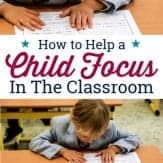
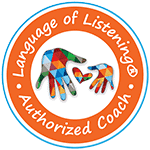
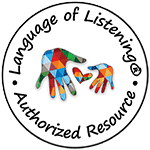
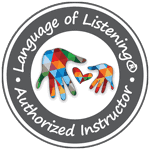









Thanks. This article gave me so much inside about how to deal with my kid and his trouble of focus at the classroom.
Thank you for the tips. We just got my son’s report from school and the teacher noted that he wasn’t participating much in class. When we talked with him, my son said he found it hard to concentrate. Now that we have an unexpected extended fall break (thank you COVID 🙁 ) we are going to try a few different things to help him when school starts back up.
You can encourage children to read too. Reading requires the brain to focus on the words. But the key is to get your kids to read 🙂
My seven year old daughter’s teachers are reporting daily she’s not focusing. What can I do at home to help my kid?
U am a tutor working with autistic 5 year olds, it’s my job to keep the children engaged in the activities whilst learning to wait for there turn. We work with groups of 4 children at a time, I’m finding it difficult to keep the children waiting for their turn to stay seated and wait for there turn any thoughts how this might be achieved ? Thanks
Looking for the series of activities that can be used to develop vestibular and proprioceptive input.